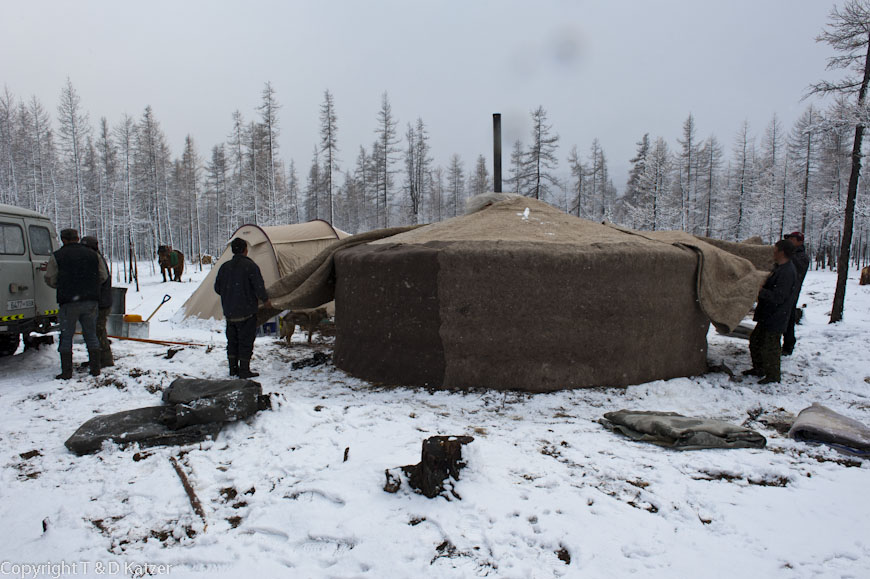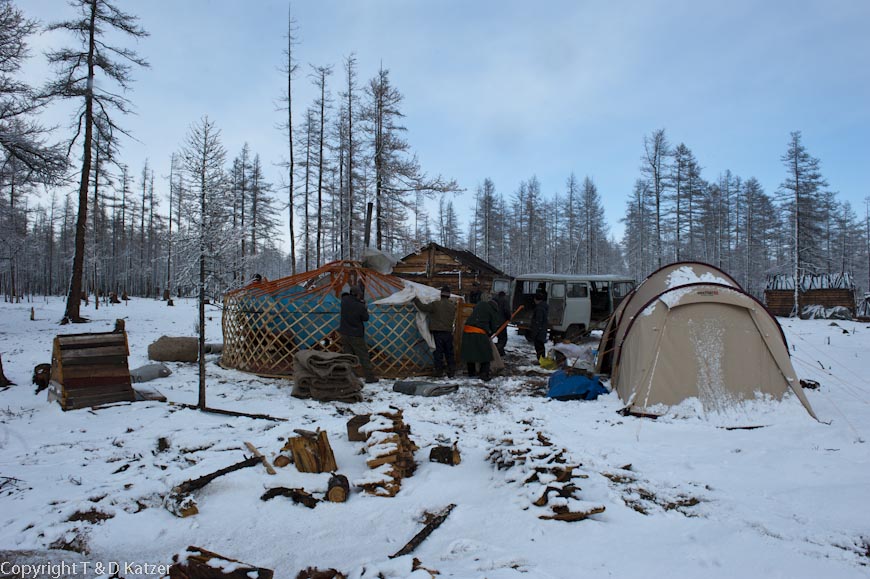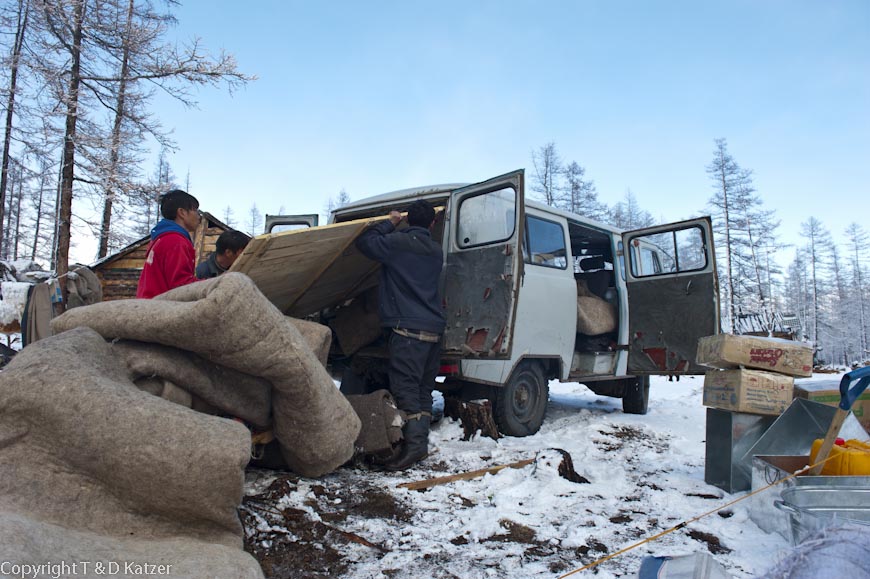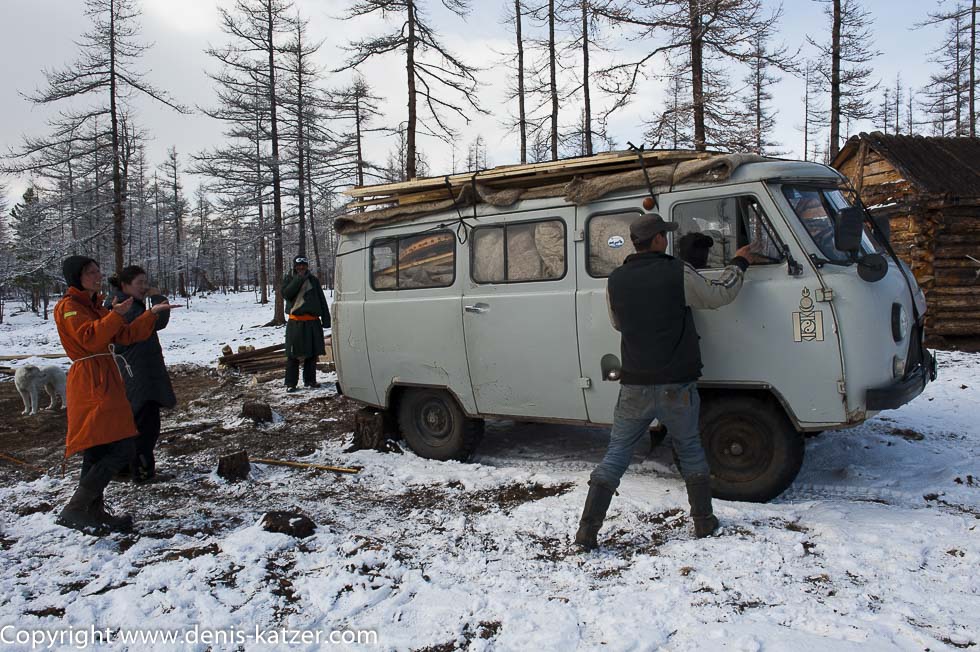
Unexpected yurt dismantling
N 51°33'337'' E 099°15'341''
Day: 266
Sunrise:
06:26
Sunset:
20:19
Total kilometers:
1341
Soil condition:
Ice, snow
Temperature – Day (maximum):
8°C
Temperature – day (minimum):
minus 2°C
Temperature – Night:
minus 15°C
Latitude:
51°33’337”
Longitude:
099°15’341”
Maximum height:
1981 m above sea level







In a cold wind and heavy snow, I hurry to log cabin one early in the morning to see if our neighbors have been able to organize a truck to transport our yurt. “Yes, we have a truck coming tomorrow,” says Tsaya. “Oh, tomorrow,” I reply, surprised at the apparently serious early appointment. Just five minutes later, the one hundred percent safe truck appointment has vanished into thin air. “He can’t come because he gets more money for transporting jade. Unfortunately, there are only 4 trucks with four-wheel drive in the whole of Tsagaan Nuur. That’s why it’s almost impossible to hire one at this time of year. Another reason is that the inhabitants of the village start cutting wood for the winter in spring and have it transported away by truck. The drivers can transport two to three loads of wood a day this way, which means they earn far more than a trip to the taiga to pick up a yurt,” I hear Tsaya say, as if defending the drivers. “That’s all right. And what do we do now?” I ask myself, inwardly annoyed at Shagai, who doesn’t look after his yurt and leaves everything to us. Of course, we couldn’t care less about the yurt now. We could move out and leave them in the taiga. But since we also shipped them to the Tuwa camp, the moral responsibility for returning the felt house to its original location lies with us.
After a few more phone calls, Ultsaan’s brother-in-law Hohood agrees to pick up our yurt in a four-wheel drive bus. “Will she fit in there? The wooden floor is far too big,” I point out. “If you pay him the same as for the truck, he’ll put them up. If necessary, he’ll drive twice,” explains Tsaya. “A four-gun normally costs 80,000 tugrik, but the truck costs 120,000 tugrik (€46). (69,- €) No, that’s too expensive,” I reply. In another phone call, Hohood reduces his price to 110,000 Tugrik. (62,- €) “105.000 Tugrik (60,- €) and we are in business”, I make another attempt to negotiate. “Okay, I’ll come for 100,000 Tugrik”, (57,- €) his answer amazes me. “It’s a deal. 100,000 tugrik and he brings out the whole yurt. When will he come?” “Today.” “Today?” I ask, startled. “He has to go to Mörön tomorrow. It’s today or never.” “Okay, today. When will he be there?” “In three hours,” says Tsaya as if it were the most normal thing in the world. “Three hours. How are we supposed to break up our entire household?” “Don’t worry about it. When he comes, I’ll feed him for the first time. You’ll manage,” she says. “Well, I’ll see you later. I’m very, very busy from now on,” I reply, hurrying to our yurt and hoping Hohood won’t ditch us or change the appointment again.
“Hohood will be here in three hours,” I startle Tanja as I step into our den. Tanja then takes it in her stride and immediately starts packing her kitchen into boxes. Like a nimble weasel, I now sprint back and forth between our yurt and our big tent, which we put up for the first time yesterday as a test. As I suffered from the strong wind last year while writing about our experiences and couldn’t find any shelter from it, our tent sponsor reacted quickly and sent us a storm-proof house tent. Because we had to change our plans from Mörön onwards due to the high mountains and had to leave our horse-drawn cart behind, we had to pay for the 20 kg. heavy tent has no room in the panniers. And now this tent is actually turning out to be a blessing. The plan is to move all our belongings from the yurt into the tent and sleep there. It will be cold, but we have no other chance. At the spring camp we live in a tipi where you can light a fire again. Until then, we need to think warm thoughts. At 15:00 our yurt is empty. Only the wall unit, Bilgee’s bed and the stove remain in our once beautiful and cozy dwelling. “It’s a shame to have to move out here,” I say a little wistfully. “Yes, it was a wonderful and certainly unforgettable time,” Tanja replies. “We won’t be living in such a cozy home for a long time. I think a tipi is quite uncomfortable and cold in comparison.” “But certainly an interesting experience.” “Without a doubt,” I reply, after which we leave our own yurt for perhaps the last time in our lives. As soon as we stand outside, wet snow blows in our faces. We immediately start dismantling the mobile dwelling. Ultsan, Hohood and a few others help us, which is why the yurt is dismantled into its individual parts in 15 minutes and Hohood immediately stuffs it into the four-gun. “A real packing artist,” I say with a laugh as he lies on his back in the four-wheel drive vehicle and presses both feet against felt mats to make use of even the smallest corner. When the interior is packed to the roof, the Tuwa and Hohood tie up the wooden floor on the roof, which has been cut into six pieces. As soon as the floor parts have been loaded, Ultsan’s brother-in-law jumps into the car and speeds off. “Sain jawaaraj!” (“Have a good trip!”), we call after him as the gray vehicle is already swallowed up by the snow-covered forest.
Tanja and I are now standing in the wet snow and don’t know what has happened to us at first. “You can lose your house that quickly,” I joke. Then we go into our tent, shivering. “And what do we do now?” asks Tanja, standing in the chaos of random pieces of luggage piled on top of each other. “Trying to bring order to the mess,” I reply, also barely able to move. Our sleeping mats are already in the spacious sleeping area of the tent. I leveled out the extremely uneven floor with felt mats and pieces of clothing so that we were lying reasonably straight. “It looks cozy,” says Tanja. “True, but damn cold,” I reply as the frozen ground shines like a freezer. “It’s only for one night. Tomorrow we’re going to the spring camp and we’ll be staying in a tipi there,” says Tanja. “I hope,” I reply, feeling an uneasy sense of foreboding.
As Tanja accompanies Bilgee to the horses to carry the food for Mogi, who is keeping watch there, I clear out our entire tent again and put all the planks of our former, now dismantled Wandan inside as a base. This way we also have a straight surface in the awning on which I now arrange our belongings so that there is even room for two folding chairs. “Almost a bit cozy,” Tanja says happily as she returns from Bilgee’s outdoor camp and sinks into one of the chairs. Wrapped up in our warmest clothes, we sit in our new home and open a bottle of beer that Hohood brought us from Tsgaaan Nuur. “Ice party,” I joke, sipping the half-frozen hop brew. I’m just pouring the second cup full when Bilgee reappears. “Well, you have it nice here,” he says with a laugh. We immediately offer him a cup of beer. “Because you left your Deel in Tsagaan Nuur, I wanted to ask if I could lend you mine. It’s far too cold in this tent,” he says solicitously. “Thanks for asking, but I’m fine. You need the Deel more than I do because I have a sleeping bag,” I reply. We are now sitting there at minus 10 degrees, blowing clouds of condensation as we talk, eating peanuts and drinking beer. At 21:00 Bilgee leaves us to go to the outdoor camp. He spends the nights there in a small tent and watches over the horses. We retire to the sleeping cabin and snuggle into our sleeping bags. Because we have spent the last four months in the warm yurt, we are no longer used to this cold. Even if the thermometer only drops to minus 15 °C that night.
We look forward to your comments!

